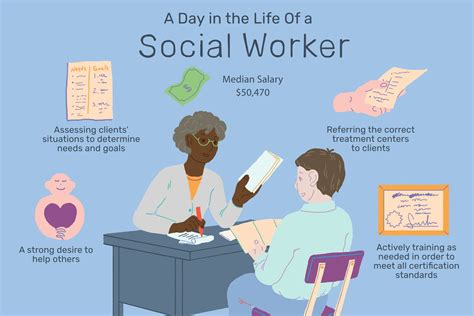Are you someone who is passionate about making a positive impact on the world while also earning a living? Social work may be the perfect career choice for you. In this blog post, we will dive into the complex world of social work salaries. From the factors that affect your earning potential to the different specialty areas that can impact your salary, we will cover it all. Whether you are just starting out in the field or are looking for ways to maximize your income, we have you covered. Join us as we explore the various aspects that contribute to social work salaries and gain valuable insights into how you can make a difference while also securing a stable financial future. So, if you are interested in knowing more about how education, experience, location, and sector can impact your earning potential as a social worker, keep reading for all the details.
Table of Contents
An Overview of Social Work Salaries
When considering a career in social work, it’s important to have a clear understanding of the potential salaries that come with this profession. Social work salaries can vary significantly based on a number of factors, including education, experience, location, and the specific field of social work. By gaining a comprehensive overview of social work salaries, individuals can make informed decisions about their career paths and understand the potential earning opportunities within the field.
One of the key factors that influence social work salaries is education. Typically, individuals with a higher level of education, such as a master’s degree in social work, will command higher salaries than those with a bachelor’s degree or lower. Additionally, specialized certifications and credentials can also impact earning potential within the field of social work.
Experience is another crucial element when considering social work salaries. Entry-level positions will generally offer lower salaries, while more experienced professionals can expect to earn higher wages. This emphasizes the value of accumulating experience and expertise within the field in order to maximize earning potential.
Location plays a significant role in determining social work salaries as well. Salaries can vary widely based on the cost of living in a specific area, as well as the demand for social workers. Urban areas and regions facing social work shortages may offer higher salaries to attract and retain qualified professionals.
Factors Affecting Social Work Salaries
When considering a career in social work, it’s important to understand the various factors that can impact your potential salary. One of the most significant factors is the level of education and experience you have. Social workers with advanced degrees or several years of experience in the field typically command higher salaries than those who are just starting out. Additionally, the location of your job can also play a significant role in determining your salary. Social workers in urban areas or areas with a high demand for their services may be able to earn higher salaries than those in more rural or underserved areas.
Another factor that can affect social work salaries is the type of organization or agency for which you work. Private sector social workers, for example, may earn higher salaries than their counterparts in the public sector. Similarly, social workers who specialize in a particular area, such as healthcare or mental health, may have the potential to earn higher salaries than those working in more generalist roles. Additionally, the level of responsibility and leadership within your role can also impact your salary, with managerial or supervisory positions often commanding higher compensation.
It’s also important to consider the impact of industry trends and economic conditions on social work salaries. Changes in government funding or shifts in public policy can influence the demand and compensation for social workers in certain fields. Similarly, advancements in technology and shifts in the delivery of social services can impact the demand and value of certain skills, which in turn can impact salaries within the field. Keeping abreast of these factors can help social workers proactively navigate their career paths and maximize their earning potential.
In conclusion, a variety of factors can influence social work salaries, from education levels and experience to geographic location and industry trends. By understanding and considering these factors, social workers can make informed decisions about their careers and take steps to maximize their earning potential within the field.
Understanding the Entry-Level Social Work Salary
When entering the field of social work, it’s important to have a realistic understanding of the entry-level social work salary. Many individuals are drawn to social work due to their passion for helping others, but it’s crucial to be aware of the financial aspects as well. Entry-level social work salaries can vary based on a number of factors, including education, location, and the specific area of social work being pursued.
One of the primary determinants of entry-level social work salaries is the level of education and credentials that an individual possesses. Those with master’s degrees or specialized certifications often have access to higher-paying entry-level positions, while individuals with only a bachelor’s degree may start at a lower salary. Additionally, the specific field of social work being entered can also impact entry-level salaries. For example, clinical social workers may receive different starting salaries than child welfare case managers.
Another important factor influencing entry-level social work salaries is the location in which an individual is seeking employment. In areas with a high cost of living, entry-level social work salaries may be higher to compensate for the increased expenses. On the other hand, in more rural or economically depressed areas, entry-level salaries may be lower.
It’s also vital to understand that while entry-level social work salaries may not be as high as in other fields, there are opportunities for growth and advancement. Gaining experience and developing specialized skills can lead to higher salaries and increased job opportunities in the future.
The Impact of Experience on Social Work Salaries
When it comes to social work, experience can have a significant impact on salaries. Many factors can affect social work salaries, but experience is one of the most important. As social workers gain experience in the field, their salaries tend to increase as well. This is due to the valuable knowledge and skills that come with years of practice.
Having experience in social work allows professionals to take on more complex cases and demonstrate their ability to handle difficult situations. With this increased responsibility and expertise, social workers become more valuable to their organizations, which can lead to higher salaries and opportunities for advancement.
Employers recognize the significance of experience and are often willing to compensate social workers accordingly. As social workers continue to grow and develop in their careers, their level of experience becomes a strong negotiating tool when discussing salaries and benefits.
Overall, the impact of experience on social work salaries cannot be overlooked. It plays a crucial role in the professional development and financial success of social workers, making it an essential factor to consider in the field of social work.
Exploring Social Work Salary Growth Opportunities
As social workers gain more experience and expertise in their field, they open themselves up to a variety of salary growth opportunities that can significantly impact their earning potential.
One way in which social workers can increase their salaries is by specializing in a certain area of social work. By focusing on a specific population or issue, social workers can become experts in their field, leading to increased job demand and potentially higher pay.
Additionally, obtaining advanced education and credentials can also play a major role in salary growth opportunities for social workers. A master’s degree in social work, for example, can open doors to higher-paying positions and leadership roles within social work organizations.
Overall, by focusing on specialization and continued education, social workers can explore a myriad of salary growth opportunities that can lead to a more financially rewarding and fulfilling career.
Specialty Areas and Their Influence on Social Work Salaries
Specialty areas within the field of social work can have a significant impact on the salaries of professionals. Social workers who specialize in areas such as healthcare, mental health, or substance abuse tend to earn higher salaries than those who work in more general practice roles. This is often reflective of the extra training and expertise required for these specialized areas, as well as the higher demand for professionals with these skillsets in the job market.
Furthermore, social workers who specialize in certain areas may have the opportunity to work in higher-paying settings such as hospitals, private practices, or research institutions. For example, clinical social workers in healthcare settings often earn significantly more than those working in community-based organizations. The specific environment in which a social worker practices can have a direct impact on their earning potential.
Another factor to consider is the geographic location in which a social worker practices. While certain specialty areas may be highly lucrative in one part of the country, they may not be as in-demand in others. For example, social workers specializing in gerontology may find higher salaries in areas with aging populations, while those specializing in child welfare may find better opportunities in areas with higher rates of child poverty and abuse.
Ultimately, the influence of specialty areas on social work salaries is multi-faceted and depends on a variety of factors including demand, expertise, and geographic location. Social workers should carefully consider the potential impact of specializing in a particular area on their earning potential before pursuing advanced training or certification.
Examining Social Work Salaries by Location
When it comes to social work salaries, location plays a significant role in determining how much professionals in this field can expect to earn. Different cities and states have varying living costs, demand for social workers, and resources available for social services, all of which can impact the compensation in this field.
For example, social workers practicing in New York City can expect to earn significantly more than those in smaller towns in the Midwest. This is due to the higher cost of living in metropolitan areas, as well as the greater need for social services in densely populated urban settings.
On the other hand, rural areas and regions with lower population density may have a lower demand for social workers, resulting in comparatively lower salaries. It’s important for social workers to carefully consider the location in which they plan to practice, as this will have a direct impact on their earning potential.
Furthermore, social work salaries can also vary based on the specific type of organization within a particular location. For example, a social worker in a non-profit agency in San Francisco may earn a different salary than one working in a government institution or a private practice setting in the same area. Understanding these nuances is crucial for social workers as they navigate their careers and seek opportunities for growth and advancement.
Private vs. Public Sector Social Work Salaries
When it comes to pursuing a career in social work, professionals have the option to work in either the private or public sector. Each sector comes with its own set of benefits and challenges, including differences in salary potential. Understanding the differences in salaries between the private and public sectors can help social workers make informed decisions about their careers.
One of the main factors that influences salaries in the private versus public sector is funding. Public sector social workers are often funded by government agencies, which means that salaries may be more stable and subject to less fluctuation. On the other hand, private sector social workers may be employed by for-profit organizations or private companies, which can lead to potentially higher salaries but with less job security.
Another aspect to consider is the type of work and clientele. Public sector social workers may be more likely to work with vulnerable populations, such as those in need of government assistance or support. This can be rewarding on a personal level, but may come with lower pay compared to private sector social workers who work with clients who can afford to pay for services.
It’s important for social workers to weigh the pros and cons of working in the private versus public sector, including salary considerations. Ultimately, the decision should align with the individual’s career goals, values, and financial needs.
How Education and Credentials Impact Social Work Salaries
Education and credentials play a crucial role in determining the salaries of social work professionals. Those with higher levels of education tend to command higher salaries, while individuals with specialized credentials often have an advantage in the job market.
Obtaining a bachelor’s degree in social work is the minimum requirement for many entry-level positions in the field. However, pursuing a master’s or doctoral degree can significantly impact earning potential. Social workers with advanced degrees often qualify for higher-paying and leadership positions within organizations.
In addition to formal education, specialized credentials such as clinical social work licensure and certifications in specific practice areas can also affect salaries. These credentials demonstrate a higher level of expertise and commitment to professional development, making individuals more competitive in the job market and eligible for higher salaries.
Employers may also offer higher salaries to social workers with specialized skills, such as fluency in multiple languages, experience with diverse populations, or expertise in a particular area of practice. Continuing education and staying informed about the latest research and best practices in the field can also enhance a social worker’s marketability and earning potential.
Tips for Maximizing Social Work Salaries
Tips for Maximizing Social Work Salaries
When working as a social worker, there are several tips that can help you maximize your salary. First and foremost, one of the most important things is to continue advancing your education and obtaining relevant credentials. By pursuing additional degrees or certifications, you can increase your skill set and make yourself more valuable in the job market. This can lead to higher starting salaries and better opportunities for advancement.
Additionally, it’s important to network and build strong professional relationships within the social work community. By connecting with other professionals and learning from their experiences, you can gain valuable insights and potentially discover new employment opportunities with higher salaries. Networking can also help you stay updated on industry trends and best practices, making you a more competitive job candidate.
Another way to maximize your social work salary is to consider working in specialty areas that are in high demand. For example, specializations in mental health or medical social work often offer higher salaries due to the specialized nature of the work. By gaining experience and expertise in these specialized areas, you can command a higher compensation for your services.
Finally, it’s important to negotiate salary and benefits when considering a new job or promotion. Many social workers are hesitant to discuss compensation, but it’s crucial to advocate for fair pay and adequate benefits such as health insurance and retirement contributions. By knowing your worth and effectively negotiating, you can ensure that you’re being fairly compensated for your skills and contributions.





